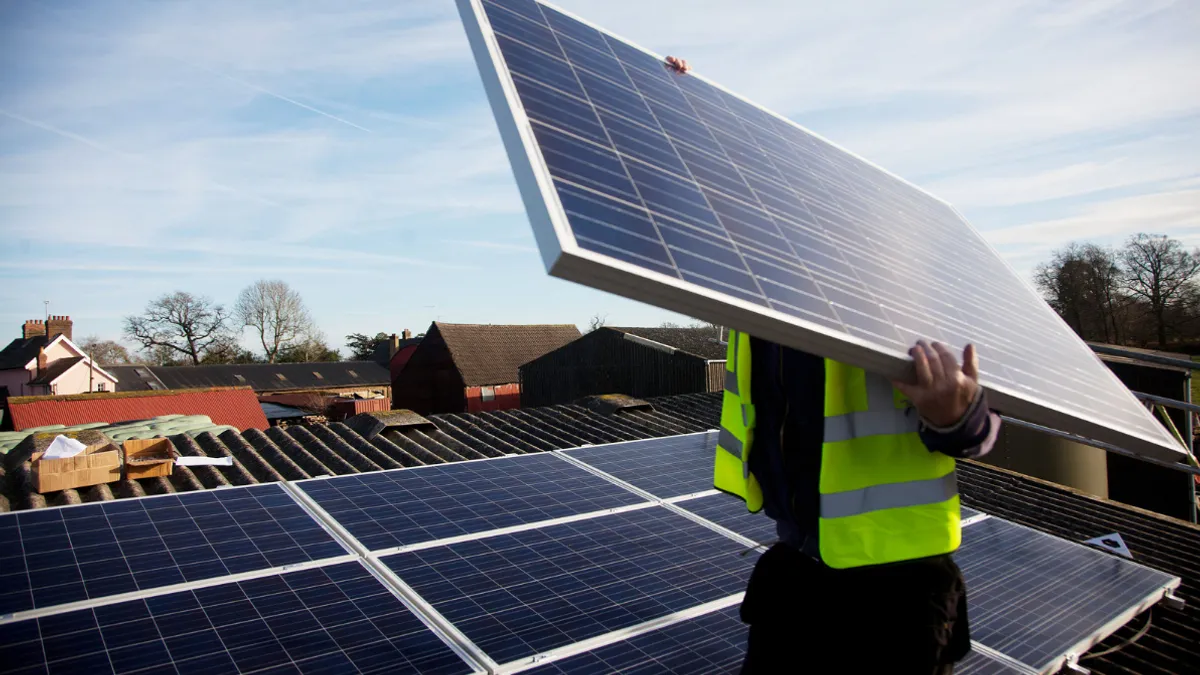Dive Brief:
- The Illinois Commerce Commission (ICC) on Thursday set a series of deadlines in a new order aimed at resolving by early November the conflict between Ameren Illinois and residential solar installers about how much solar energy existing home systems are pumping into the utility's local distribution system — and how much Ameren must pay additional customers who opt for residential solar.
- At issue is whether the 3,000 Ameren customers who already own home solar arrays pushed enough excess power into the utility's wires last year to equal 5% of Ameren's total demand or load — a percentage that by law would allow Ameren to reduce what it pays for the excess energy. The company argues it must reduce payments to additional solar homes to comply with its tariff previously approved by the ICC to comply with state law.
- The ICC has given the utility a week to marshal its legal arguments proving its assertion that because the commission previously approved the tariff controlling the net metering credits, it cannot now simply alter it. And the commission has given its own analysts just over two weeks to verify Ameren's data and calculations as to the percentage of power home solar contributes to the electricity flowing throughout the company's delivery system.
Dive Insight:
Facing an outcry from solar installation companies whose business sales model has been based on customers receiving the full retail net metering credit, Ameren has also had to defend itself for months from a simultaneous legal barrage before the ICC from solar trade groups and allied environmental groups.
The underlying financial issue fueling this fight is that currently Ameren credits the owners of home solar systems the full retail price — averaging about $0.105/kWh — for excess power they generate and push into the utility's local distribution system. Once home solar reaches the 5% saturation mark, the utility is required to net meter and credit new home solar owners only for the energy they generate, which averages between $0.045 and $0.05/kWh, depending upon the time of year.
That difference changes the affordability of home solar, say installers, including those who testified before the commission on Thursday. Ameren has argued that as additional solar is added by customers who can afford it, at some point, rates will have to increase, which would affect lower income families the most. Solar advocates have dismissed that claim as a frequently cited argument by utilities and have countered that distributed solar actually can decrease the need for a larger distribution system.
Ameren notified the ICC at the beginning of the year, as required by law, that residential solar had reached the 3% saturation and could hit 5% could before the end of the year. The agency in turn opened a case to verify the claim. Interested parties immediately intervened to challenge Ameren's assertion.
In July, an ICC administrative law judge ruled that the company had figured the percentages inaccurately and using her own interpretation of the language in a 2016 law designed to foster the growth of home solar calculated that the percentage of power from residential arrays was less than 2%, not 3% as the company had claimed, requiring it to notify the commission.
The case dragged into early fall without resolution. After opponents asked for an emergency order preventing Ameren from reducing the net metering rates until the percentage of solar saturation is litigated and determined, the company last week informed the ICC it intended by its November billing to switch to the reduced credits for customers who registered solar arrays after Oct. 2.
Because the switch to a lower reimbursement is part of Ameren's commission-approved tariff, the ICC realized that it could not merely order the company to continue the with the full retail net metering if in fact residential solar has now reached 5% of the company's power capacity or demand.
Thursday's ICC order requires Ameren to submit its legal reasoning by Oct. 15 as to why it believes the commission cannot legally stop it from switching to the energy-only net metering. And the order requires commission's staff to verify the company's customer data and calculations by Oct. 23.














